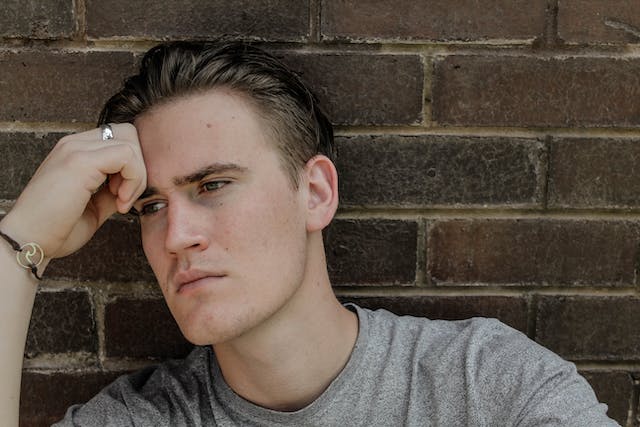Happiness
Episode 76: If You Want to Be More Productive, Cut Yourself Some Slack

Evan Sharp The year is 2009. It’s the end of the year. I’m in New York city studying architecture in graduate school at Columbia University, and I’m really broke and, you know, going into debt for school. I get connected to this guy, Ben Silverman, who, you know, we connect over email and has a lot of the same passions. And we start emailing about the internet and websites and, like, data visualization.
And so we built this website where you can bookmark things, you find online images. And now, much later we’re actually up to, I think over 330 million users.
I never feel that I am good enough or do anything well enough. You know, you would think at some level it’s a, it’s a great success and that I would feel, you know, super happy and, and I do, I’m so happy on some level. But, It’s never good enough for me. And when I use it, all I kind of see all the things that I wish were better and the details that, you know, we kind of missed when we were building it.
And that’s just sort of a default lens that I have on a lot of my life.
I’ve just started to realize how much I’m a victim of my own self-criticism and how much more, you know, powerful I am as a leader, and hopefully as a husband and a father when I am connected to those self-critical parts and I’m able to be compassionate with myself.
Dacher Keltner I’m Dacher Keltner, and this is the Science of Happiness today. Today, I’m pleased to welcome Evan Sharp, the co-founder of Pinterest, the image-sharing social media site.
Evan’s been leading efforts at Pinterest around a model he calls “compassionate design,” with the idea that kindness can be at the heart of digital design and that what should really matter is people’s emotional health when they’re online, as opposed to clicks.
When we asked Evan to try a science-tested happiness practice, he tried one where he directed the kindness he would give to a friend towards himself. He joins us from his home in the San Francisco Bay area to tell us how it went.
Evan, thanks for joining us today.
Evan Sharp Oh, Dacher it’s so lovely to be here. I’m such a big fan of the podcast. I’ve been listening for a long time. And so it’s quite a treat to be on the other side.
Dacher Keltner I’m curious, you know, you’re thinking hard about this idea of compassionate design and it’s challenging. You know, I just think that the, kind of the nature of the interface, the fact that you’re often isolated, you know, the linear nature of the information, it works against compassion in many ways.
How do you think about compassionate design?
Evan Sharp A lot of the reasons people come to Pinterest is, you know, they come to look at inspirational quotes or because they’re, you know, they’re feeling bad. And so, you know, we’ve thought a lot in the last couple of years about how to reach people who are feeling bad on Pinterest and actually inspired a lot by your work, Dacher.
You know, now if you go and you search for something on Pinterest that says, maybe you’re depressed or lonely, we try and meet you with some practices that, you know, science says will help address that emotional state. But I think that’s really just scratching the surface of what we can do to kind of meet people compassionately when they need help on our service.
Dacher Keltner So Evan, you chose the self-compassionate letter practice, where you write a letter to yourself about one of your weaknesses with the same kindness that we typically direct towards our friends. I know so much of your work at Pinterest is about compassion for others. What made you want to explore self-compassion?
Evan Sharp I’ve always been someone who is a little too hard on himself. I’m very self-critical and, you know, I think being able to turn that inner critic into more of a compassionate advocate—it’s just helped me be less a victim of how I feel and be more positive and more centered, and that’s been really helpful given how much stress I feel like I’m under all the time at work.
Dacher Keltner So Evan, can you walk us through the steps of the self-compassion letter?
Evan Sharp Sure. I’d be happy to. There’s a practice where it asks you to kind of write yourself a letter about an area where you feel self-critical and then to kind of flip it and to describe it in a way that’s positive. And so, the thing that I was really focused on when I started the practice was how bad I’ve been recently at hitting deadlines and showing up in a way that kind of helps the broader teams at Pinterest align to what we’re doing and do it in a timely fashion.
And I feel like my entire life I’ve really struggled to meet other people’s deadlines, whether they’re at school or work. It’s very, very difficult for me to kind of let go and just do something based on time instead of doing it really, really well. When I miss a deadline or when I perceive that I’m not—I just feel so, so self-critical.
So, I wrote myself a letter. It starts off, you know, focused on the thing that I feel shame about or self-critical about. But then later it kind of flips that. The practice asks you to describe. What would happen in a world where it was flipped, and you were really, really good at the thing that you feel that you’re bad at, but maybe you didn’t have another superpower in your life.
Dacher Keltner Can you read a little part of it to us?
Evan Sharp Sure, Let me see. All right, Evan: I want you to close your eyes and imagine the opposite. What if you were incredible at leading teams to hit deadlines, but you didn’t have a vision or a sense for what you were building and why it mattered. I think you would feel lost.
You would feel blind. Kind of all dressed up with nowhere to go. And to me, you know, what this exercise did was shifted my attention from what I feel I’m so bad at, and it helped me feel a much deeper appreciation for what my superpower is. It made me feel grateful for my ability to kind of see deeply into projects and see what the most critical part is and make sure that we do that really, really well.
Dacher Keltner That’s really cool. So, the instructions say to also write the letter from the perspective of a friend. What was that step like for you?
Evan Sharp So I wrote that letter kind of thinking about my friend, but really writing it to myself. And I was just amazed how differently I relate to friends than to myself. It’s so easy for me to give words of encouragement to a friend, and so hard for me to give words of encouragement to myself. And so that little trick of thinking about, oh, what would you say to a friend who’s going through what you’re going through? And then flipping that on its head and actually saying that to myself, it’s just a really powerful little tool I’ve learned. You know, I wrote this letter to myself, but I’ve even found myself doing it just in my head, you know, in 10 seconds when I’m feeling really, really something critical.
Dacher Keltner Yeah. I hear you.
Evan Sharp You know, sometimes when I’m self-critical, it kind of feels like there’s a point, but then other times there’s was not a point, you know, I’m just like, oh, mindlessly, you know, just too self critical in a way that’s not helpful. And so I’ve just been trying this last six months, especially to be just a lot more mindful of, you know, is there a point to how I’m feeling or is it sort of just a pattern of, of how I feel that’s just something that I’ve always had? And there’s a real power in being more aware and more mindful of which of those I’m going through.
Dacher Keltner That’s so interesting. Aristotle had this great idea of like, we need every passion in our mind, right? Even anger and fear and so forth, as long as they have a point, right, that is appropriate for the context, and that, that feels like a good guideline to be thinking about. I hadn’t thought about that.
Evan Sharp Yeah. For me, really being myself requires me to accept myself, you know, weaknesses and all. And the paradox here is, you know, what I’ve found over the last 10 years. Growing this company has been that the more I’m able to be myself at work and kind of let go of things I’m not good at, the healthier it is for me, everybody in the better the work I do is. And that sounds maybe obvious, but it’s not obvious to me. Like when I see myself doing something poorly, my first tendency is to be self-critical.
Dacher Keltner You know, research by Serena Chan and Julia Brian shows that one of the things that it does is, you know, when you write self-compassionate letters to yourself or practice, self-compassion, you start to feel a little sense of motivation, like, wow, I’ve got this good stuff that I can, you know, work harder at my foibles. Did you have a sense of that empowering sense of energy there?
Evan Sharp You know, I actually really did. The practice also asked you to revisit it a week later and it just so happened that about a week later, I was feeling really self-critical in the same way.
And you know, another part of this letter that I wrote to myself, it kind of talks about, you know, where I would be in five or 10 years if I spent all my time trying to focus on the thing that I don’t do well, instead of doubling down on the things I do super well. I think what helped motivate me here was a realization that wow, 20 years from now, if I just lean really deeply into what I’m great at, you know, which is setting a vision and identifying them the most critical thing to execute and then helping execute it really, really well. And then lean on other people whose superpower is setting deadlines and leading teams to hit them. That that’s the path that will lead to my, you know, most fulfilling and happy and impactful work life.
I’ve just started to realize how much I’m a victim of my own self-criticism and how much more, you know, powerful I am as a leader and hopefully as a husband and a father, when I am connected to those self-critical parts and I am able to be compassionate with myself.
Dacher Keltner Well, Evan, thank you so much for being on the Science of Happiness. It’s really wonderful to talk with you.
Evan Sharp Yeah. Thanks so much for having me. It’s been a real pleasure.
Dacher Keltner People are often concerned that self-compassion is soft, that it’s indulgent, self-absorbed, that it’s really just letting yourself off the hook.
Serena Chen But, that’s not really true to self-compassion. Actually, when you view a personal weakness or failure through a self-compassionate lens, you actually are more willing to take responsibility for your role.
Dacher Keltner More on the science, up next.
Serena Chen It seems counterintuitive at first, or to many people it still seems counterintuitive that treating the self with such kindness, non-judgment, no criticism at all would make people actually want to do better, next time, want to improve themselves versus just being complacent.
Dacher Keltner Serena Chen is the first Asian American chair of the psychology department at UC Berkeley.
Serena Chen A lot of people, including myself, when I first heard about self-compassion thought this is kind of being luxurious. It’s over-kind to the self, and you know, it doesn’t really fit my cultural background to be compassionate to the self. My background is more, be critical, get it together. Let’s go.
Dacher Keltner But Serena’s research shows that self-compassion is what helps us get it together. In one study, she got a group of undergrads into her lab and gave them a fake GRE test.
Serena Chen But a really hard GRE test, that was by design really hard so that everybody would fail. So we’re making everybody feel, you know—experiences personal failure.
Dacher Keltner Imagine doing poorly on a test. A lot of people never want to take that test or anything like that test ever again.
Serena Chen A lot of times it undermines our desire to study, work harder, put in the effort. “That was a really hard test. No, thank you. I’m not interested.” And then half the participants get, yeah told, “Oh yeah, you know, a lot of people, UC Berkeley students don’t do well on the test.”
Basically, really trying to focus on the portion of self-compassion that has to do with, look, you know, we’re all the same. This is a common human condition we all feel sometimes.
Dacher Keltner Serena’s team gave the other half of the participants a big self-esteem boost. We said to them, “Hey, you must be smart. You got into UC Berkeley.”
Serena Chen Then they’re all told that they need to take another test and they can take as much time as they want to study for it.
Dacher Keltner And lo and behold, what we found is if you nudge people to think about that initial test failure, in a self-compassionate way, even compared to making people feel great about themselves, people who felt self-compassionate, they persisted longer. They studied longer for that second test, that second challenging test that was going to happen.
Then those in the self-esteem condition — to us, [it was] a sign of persistence, a sign of wanting to do better versus like, “Whatever, I’m not going to study that much. I don’t want to get that sort of negative feedback again. Blah, blah, blah.”
Dacher Keltner People who are more self-compassionate have better coping skills, are more resilient to stress, and feel more motivated to achieve their goals.
Serena Chen Self-compassion is not about not taking responsibility. Actually, when you view a personal weakness or failure through a self-compassionate lens, you actually are more willing to take responsibility for your role.
You’re not going to be able to improve and grow unless you acknowledge that you have some weaknesses, that you are responsible in part. And that’s what self-compassion does. It creates yourself in an atmosphere of warmth and understanding, which helps us acknowledge negative things, which helps us say, “Oh, we do have that weakness. I need to work on that,” versus, without that kindness and understanding, people get either overly self-critical or overly defensive.
It feels awful to have done something wrong or not gotten something you wanted, but it’s getting perspective on it and being kind to yourself about it, sort of a middle road way to respond to inevitable challenges and failures and things that will happen in life.
Dacher Keltner I’m Dacher Keltner. Thanks for joining me on the Science of Happiness. Learn how to write your own self-compassionate letter online at www.greatergood.berkeley.edu/podcasts.
Our podcast is a co-production of UC Berkeley’s Greater Good Science Center and PRX. Our senior producer is Shuka Kalantari. Our engineer is Jennie Cataldo of BMP Audio. Our associate producer is Haley Gray. Our executive producer is Jane Park. Our editor in chief is Jason Marsh. Our science director is Emiliana Simon-Thomas.
We’ve also got a new book out on the science of gratitude, featuring many of our past guests like comedian W. Kamau Bell and psychologist, Sarah Algoe. Learn more at www.greatergood.berkeley.edu/gratitudeproject.





